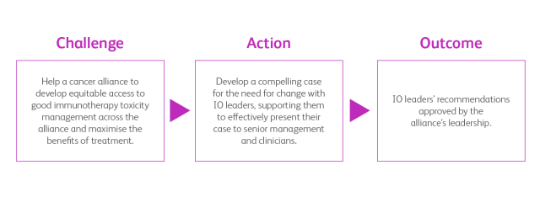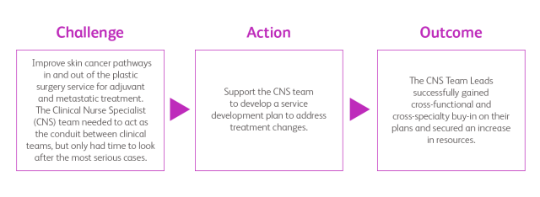Accelerating the development of immuno-oncology services in the NHS
Barriers in the era of immuno-oncology
Immuno-oncology (IO) therapies are being used increasingly to treat many forms of cancer often at the earlier stages of disease. This widening usage, coupled with an increase in the incidence of cancer and delays in diagnosis due to the COVID-19 pandemic, have resulted in NHS Cancer Centres facing increased levels of demand for IO services.
To address this, many NHS cancer centres are looking to expand their IO services to ensure access for as many eligible patients as possible, especially as IO is becoming increasingly utilised in earlier and adjuvant treatment settings. We’ve heard from many clinicians that they have limited time, knowledge of the steps required, and experience to develop their IO services, so experienced support is required.

The BMS Service Donation Programme
The BMS Service Donation Programme is an innovative approach to providing expertise to support NHS Trusts to develop their IO service development plans.
This donation programme involves an expert Change Manager from an external organisation, with extensive experience of supporting NHS service development and implementation, working with NHS Clinical Service Leaders to develop IO service development plans and prepare business cases. The donation includes up to 30 days of dedicated support over a period of up to four months and uses a structured approach that’s tailored to the specific situation and needs of each centre. Multidisciplinary team members are engaged in the service design and planning to ensure broad stakeholder buy-in. Once complete, key learnings and best practice examples are captured to support wider national NHS IO service development.
What has the Service Donation Programme achieved so far?
Within the first year, six NHS cancer centres have received a donation to support the development of their IO services, including helping to resolve challenges with toxicity management and improving treatment pathways.
Case study one – toxicity management

Case study two - improving treatment pathways

How can the Service Donation Programme evolve to meet increasing demand for IO services?
Each year, the BMS Service Donation Programme looks to prioritise the areas of biggest needs, with data solutions standing out as a focus moving forwards.
Within the NHS, information is often captured using multiple different systems, which can be supplemented by locally captured information using spreadsheets or even paper records. This makes data difficult to record and interrogate, limiting its potential value in delivering and improving services. The latest phase of the donation programme supports centres to better use IO service data as evidence to build cases for change.
At Bristol Myers Squibb we are inspired by a single vision — transforming people’s lives through science. This vision can only be achieved if cancer centres are equipped with the tools to provide innovation. We are committed to supporting the NHS, as together we work to improve access to evidence, data and metrics, and build innovation architecture.
ONC-GB-2200712
April 2023
